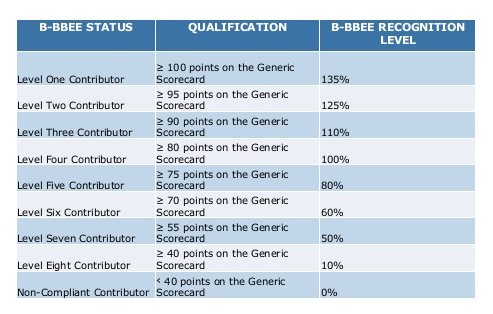What is the new B-BBEE scorecard and how does it work?

20 Jan 2016
The new B-BBEE scorecard came into effect in 2013. Although the basic principles of BEE are still intact, the elements of the scorecard, it weightings and calculations have changed a bit. Business owners and managers are encouraged to gain a decent understanding of how it works.
B-BBEE is designed to ensure economic transformation and redistribution within the South African corporate sector, to the benefit of racial groups who were previously discriminated against. In terms of B-BBEE policy, companies are assigned a score based on various criteria. The score is measured on what is known as a B-BBEE scorecard and companies that achieve high B-BBEE score stand to benefit in various ways.
The benefits of getting BEE certified
Large corporate and government entities are incentivised to use the services of businesses with high B-BBEE scores. As such, your company improves its chances of securing business if it achieves a high score on the new B-BBEE scorecard.
There is no penalty for failure to comply with the requirement. But there is a threat of missing out on sales if your competitor has a achieves higher scores.The more your business needs to makes sales to corporate and government entities the more important it becomes for it to be B-BBEE compliant. B-BBEE compliance also ensure favorable tax benefits.
How the New B-BBEE scorecard applies to different sized companies
Although all business entities are are obliged to comply with B-BEEE requirement, these requirements differ slightly and have different implications for different size business.
Big Business and government procurement processes are currently required to support businesses who are B-BBEE certified. This means that small business are more likely to secure large businesses and government entities as clients, if the small business in question is in compliance with the new B-BBEE scoreboard. Businesses with a low B-BBEE score stand to lose out. If your company has a B-BBEE certificate then your customers can claim points on their own B-BBEE scorecard for buying from your business.
The act refers to three different sized companies:
Exempted Micro Enterprises (EMEs)
These are businesses with an annual turnover of less than R10 million. EMEs are exempt from B-BBEE compliance in so far as they automatically receive a minimum B-BBEE score of 100% regardless of other factors. However, this score can increase to as much as 135% if they have black ownership. Other B-BBEE criteria do not come into play for EME’s.
Qualifying Small Enterprises (QSEs)
These are businesses with an annual turnover of between R10 to R50 million. In the past these entities only had to comply with a some criteria but in terms of the new B-BBEE scorecard QSEs must comply with all 5 elements of new B-BBEE Scorecard to score their points.
Medium to large enterprises (M&Ls)
These are businesses with an annual turnover of more than R50 million. M&Ls must comply with all 5 elements of the new B-BBEE Scorecard.
The BEE criteria
In order to get a good BEE rating, a number of criteria are set out by which your score is calculated. The 7 criteria of the past have been reduced to 5 under the new B-BBEE scorecard. These are as follows:
Equity Ownership – 25% weighting
This pertains to voting rights and shareholding. In calculating the score one looks at black ownership in general, and ownership by black women specifically. The acts also calculates ownership and voting rights among certain groups such as those below the age of 35 and above the age of 65.
Management Control – 15% weighting with 4% bonus for certain criteria
This criteria refers to the extent to which voting rights on the board is held by black members, control of the executive board, and percentage of senior management.
Skills development -20% weighting with 5% bonus for certain criteria
Skills development refers to the the extent to which a company invests in and works towards improving the skills and competencies of its black workforce.
Enterprise development – 40% weighting with 4% bonus for certain criteria
This aspect of the new B-BBEE scorecard record the extent to which small, black-owned companies are supported and developed
Socio-economic development – 5% weighting
The extent to which a company carries out social investment initiatives.
Further reading
In august we covered some recent changes to the B-BBEE landscape in more detail.
A more comprehensive guide to becoming B-BBEE compliant.
HR practitioners and others who need to be expert in the field should consider BEE training
Recent changes to the B-BBEE thresholds.
(This article is provided for informational purposes only and not for the purpose of providing legal advice. For more information on the topic, please contact the author/s or the relevant provider.)

